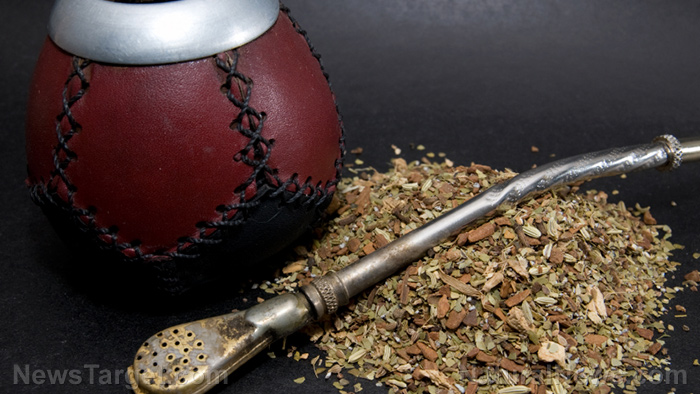
Advertisement
Coffee and tea are two of the world’s most favorite morning drinks. Both are classic pick-me-ups that can stimulate the brain and provide a much-needed burst of energy for those who are feeling sluggish. According to researchers, while both coffee and tea are rich in components that support health in various ways, the brain- and energy-boosting effects of these popular beverages can be traced to one component: caffeine.
In a recent study, researchers also found that the caffeine in healthy drinks like coffee and yerba mate is what makes them such great tools for losing weight.
The science of caffeine
Caffeine is an active, naturally occurring chemical that can be found in the leaves and fruits of some plants, such as the tea plant Camellia sinensis, the cacao tree Theobroma cacao, the Brazilian guarana Paullinia cupana and some Coffea species used to produce coffee beans. Caffeine is considered by the Food and Drug Administration (FDA) as both a food additive and a drug with stimulating properties. Because it mainly affects the nervous system, particularly the brain, caffeine is classified as a central nervous system stimulant.
Today, caffeine is one of the main ingredients in some prescription and over-the-counter medications. Thanks to its ability to increase brain activity and the circulation of chemicals inside the body, it can help combat tiredness and drowsiness, as well as enhance the effects of certain pain killers. Studies on caffeine suggest that the amount a person can consume daily depends on his body mass, health and metabolism. But the FDA recommends limiting your caffeine intake to no more than 400 milligrams (mg), or about four to five cups, a day to avoid any side effects.
Caffeine is one of the many well-known, active, plant-based chemicals that the body doesn’t have any difficulties absorbing. You can expect the effects of caffeine — which include increased heart rate, breathing, mental alertness and physical energy — to kick in five to 30 minutes after consuming a caffeinated drink. But take note that these benefits are short-lived. After a short period of drinking caffeine regularly, your body will also build a tolerance to it.
The reason for it is that the caffeine molecule is structurally similar to adenosine, a compound your body makes. In your central nervous system, adenosine levels increase or decrease to help regulate your sleep-wake cycle. When adenosine levels go up, it suppresses the activity of cells in the basal forebrain by binding to their receptors, causing you to feel drowsy. Adenosine levels only drop once you fall asleep.
But when you drink coffee or any caffeinated drink, caffeine competes with adenosine to bind to the same receptors, preventing adenosine from exerting its sleep-inducing effects. Simultaneously, caffeine excites your brain cells, resulting in your adrenal gland releasing adrenaline. Adrenaline is the hormone that increases your alertness and gives you a sudden burst of energy.
But after a while of experiencing the same reactions, your brain will start producing more receptors to accommodate adenosine. This is how caffeine tolerance develops and why coffee drinkers eventually feel that their usual three to four cups is no longer enough to keep the sleepiness at bay.
Another benefit of caffeine
Caffeine tolerance is a normal occurrence, but it’s something you’ll overcome eventually. Researchers say you’ll reach a point where you’ll find the optimal dose with your tolerance. And caffeine tolerance doesn’t affect this other remarkable benefit of caffeine — i.e., its ability to promote weight loss.
Yerba mate (Ilex paraguariensis) is an herbal tea from South America that has become known for its weight-reducing effects. In a study published in the Journal of Functional Foods, a group of researchers looked at how effective yerba mate is at reversing the effects of a high-fat, high-sucrose diet and which component of yerba mate is responsible for this benefit.
The researchers found that rats on an obesity-inducing diet responded well to treatment with caffeine extracted from yerba mate. The animals gained 16 percent less weight than those given decaffeinated yerba mate and also accumulated 22 percent less body fat. The researchers also reported the same results for rats given caffeine from either coffee or synthetic coffee, suggesting that the weight loss benefits commonly associated with caffeinated drinks are linked to caffeine.
To understand how caffeine exerts its effects, the researchers cultured fat cells isolated from mice and treated them with caffeine from coffee, yerba mate and synthetic coffee. They found that caffeine, regardless of its source, decreased the expression of two genes, namely, Fasn and Lpl. Fasn codes for an enzyme involved in the synthesis of fatty acids from glucose, while Lpl codes for an enzyme that breaks down triglycerides.
Because of caffeine’s influence on these genes, it was able to reduce fat accumulation in the livers and adipose tissue of rats on a high-fat diet. The researchers noted that lipid accumulation, especially in adipose tissue, is significantly associated with weight gain and increased body fat. Therefore, drinking caffeinated drinks like coffee or yerba mate is a great way to fight obesity and manage your weight naturally.
Organic coffee and yerba mate are two caffeine-rich drinks that you can add to a balanced diet to help you achieve or maintain a healthy weight. Black and green tea also contain caffeine, albeit less than that in coffee. Yerba mate contains 65 to 130 mg of caffeine per serving, while a cup of brewed coffee contains around 30 to 300 mg of caffeine.
Sources:
NCBI.NLM.NIH.gov [PDF]
Advertisements







